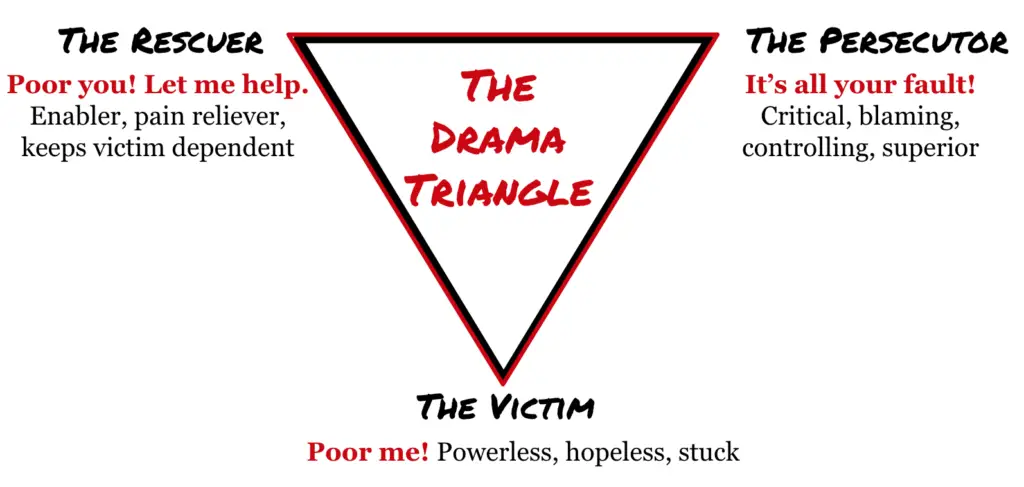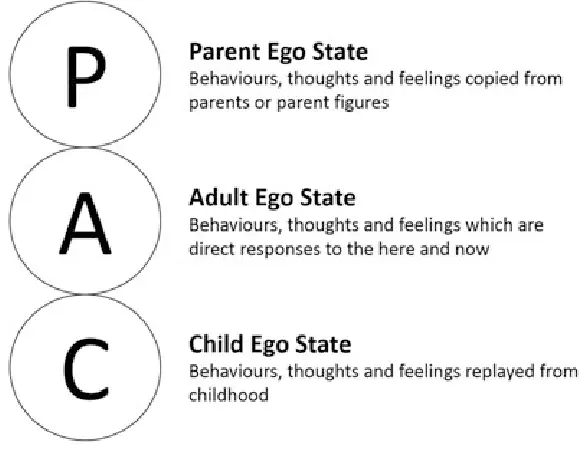Transactional Analysis was developed by Eric Berne who wrote the popular book ‘Games People Play‘.
Ego States
Berne posited that each individual possesses three basic ego states – the Parent, Adult, and the Child. These states represent a person’s internal model of parents, adults, and children. An individual may assume any of these roles in conversations with others or internally.
The Parent ego state is made up of events observed and experienced by a child from birth up to approximately the age of five. These events have not been analysed but have been accepted without question. These events are likely to involve the individual’s parents. Examples of events observed and then remembered:
Do not touch the oven.
Always say please and thank you.
The Child ego state represents brain recordings of their emotional responses to events they observed during the first five years of life. An examples is:
I feel scared when Dad is angry.
The Adult ego state comes from the time in which a child develops the capacity to perceive and understand situations that are different from what is observed (Parent) or felt (Child). The Adult serves as a data processing center that manages information from all three ego states in order to arrive at a decision.
‘Transactions’ – conversations with others can be complimentary i.e., from one adult to another adult or they can be crossed i.e., one person talks to another in an adult state and another person responds in the adapted child state (The Adapted Child ego state represents a response which has some negativity or resistance in it) as they have taken what was said ‘the wrong way.’ This can result in conflict.
Examples of Games
“Yes, but…..” The Helpless and the Martyr
An example of games people play is the game of ‘Yes, but….’
This is a ‘game’ where one person complains about something, another person responds with advice, this advice is rejected with ‘Yes, but…’ followed by reasons why they cannot take the advice/fix their problem. On a deeper level the subtext of the game is one person was asking for help which they knew they were not going to take and the other was giving advice they knew was going to be rebuffed. This is a game of the Helpless and the Martyr. The Helpless feels depressed and inadequate and the Martyr feels righteously indignant.
“If it weren’t for you!” The Controlling Husband
Another game is ‘If it weren’t for you.’ Here, perhaps a person complains that their partner stops them from doing something they want to do i.e., a wife complains ‘If it weren’t for my husband I could get a job’. In actuality, the wife is content with the husband stopping her getting a job as she actually does not want one, this may or may not be in her conscious awareness. If the husband changed his stance the wife would switch to another game.
People tend to play the same games repeatedly. Games are usually played without adult awareness and there are often moments of suprise and confusion. For example, the Martyr will be surprised and annoyed that their advice has not been taken and the Wife would be annoyed if her husband wanted her to get a job.
It can be enlightening to realise what games we play and then to understand why we do it.

The Drama Triangle comes from TA and many of our unhealthy interactions can be placed on here. In our Helpless/Martyr example, the Helpless person is in the role of the victim and the Martyr is firstly in the role of rescuer and then will perhaps switch to persecutor if they become annoyed that their advice has not been taken.



